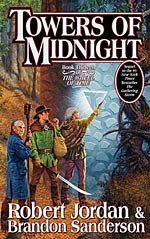
![]() jynnantonnyx
jynnantonnyx
11/16/2010
![]()
Robert Jordan's Wheel of Time series is a divisive body of work even among his long-time readers. Starting off as a close imitation of Tolkien's Lord of the Rings, by the second book Jordan had gained enough confidence in his own storytelling abilities to make his world unique. The first four novels follow the three young men who are destined to be the center of many important events leading to the Last Battle against the Dark One, a godlike being trying to escape his prison, and the novels are very action-oriented without sacrificing too much nuance of character and philosophy. Unfortunately the fifth novel, The Fires of Heaven, saw a shift from characters and action to politics and battle maneuvers. This was partially due to the fact that the three protagonists were gaining positions of political influence and had begun leading large armies, but Jordan failed to balance this new focus with the old, eventually sacrificing everything that originally made the series interesting in favor of texts that read like the dullest of history books. Jordan's penchant for free indirect style was good for the early, limited cast, but once the narrative expanded to encompass the entire known world it suddenly became both impractical and debilitating. By the eighth book the series had nearly ground to a halt, each novel consisting mainly of political and military maneuvering, usually with some major battle or event slipped into the final chapter to keep the fans happy.
With Jordan's death in 2007, many fans suspected that they would never get to see how his story ended. Despite slamming on the narrative brakes through so many novels, the occasional battle or character portrait—the chapter "Honey in the Tea" in Knife of Dreams is a great example of the latter—were proof that Jordan could still write thrilling stories if he put his mind to it. However, his increasingly debilitating sickness coupled with his longstanding promise to destroy all of his notes should he die before completing the series threatened to create a legion of frustrated fans. Thankfully, Jordan rescinded his note-destroying policy and picked fantasy novelist Brandon Sanderson to complete the series after his death. While both Jordan and Sanderson originally intended to complete the series in just one more book, it became obvious to Sanderson that it would take a trilogy to untangle all of Jordan's knots. Towers of Midnight is the second of Sanderson's trilogy, after the more politically heavy The Gathering Storm, and it is truly a return to the action- and character-centric approach of the early novels.
Despite my earlier griping about Jordan's political and military obsessions, they do begin to pay off in Towers of Midnight. That continent-spanning web he had spun starts to come crashing down like a meteor, and we finally get to see just how big the Last Battle is going to be. It still feels like Sanderson is being forced to juggle more items than he's comfortable with, but he keeps them all in the air just long enough for the big finale, which will be hitting readers in force with the upcoming A Memory of Light.
It is especially good to see so many promised character arcs pay off. Rand returns to sanity, Perrin finds a balance with his wolf nature, Mat faces the monsters of his past, Egwene establishes her rule, a royal family is reunited, an old character is rescued from a torturous fate, a possible future is glimpsed; it's like a checklist of all the things we've been wanting to see for over a decade, but which were put aside in favor of narrative machinations of questionable worth. No doubt Jordan would have given us the same things had he time, but Sanderson brings a great energy to the proceedings, which is surely why Jordan chose him as a replacement. With so many character arcs cleared away, Sanderson sets himself up for a Last Battle that will have plenty of room for action without any frustration that one's favorite character has been short-shrifted.
This would be a great place for old readers who abandoned the series to jump back on. I only skimmed Sanderson's previous novel (The Gathering Storm being saturated with politics as it was), but I couldn't put this one down. Still, this is hardly the best recommendation for convincing non-fans to start on The Wheel of Time. Depending on how well A Memory of Light wraps up the series, one wonders if it will be worth the eventual frustration to start it. Jordan created a world with a lot of promise, and we're about to find out how much of that promise will be kept.
http://blog.worldswithoutend.com/2010/11/its-always-darkest-just-before-midnight/